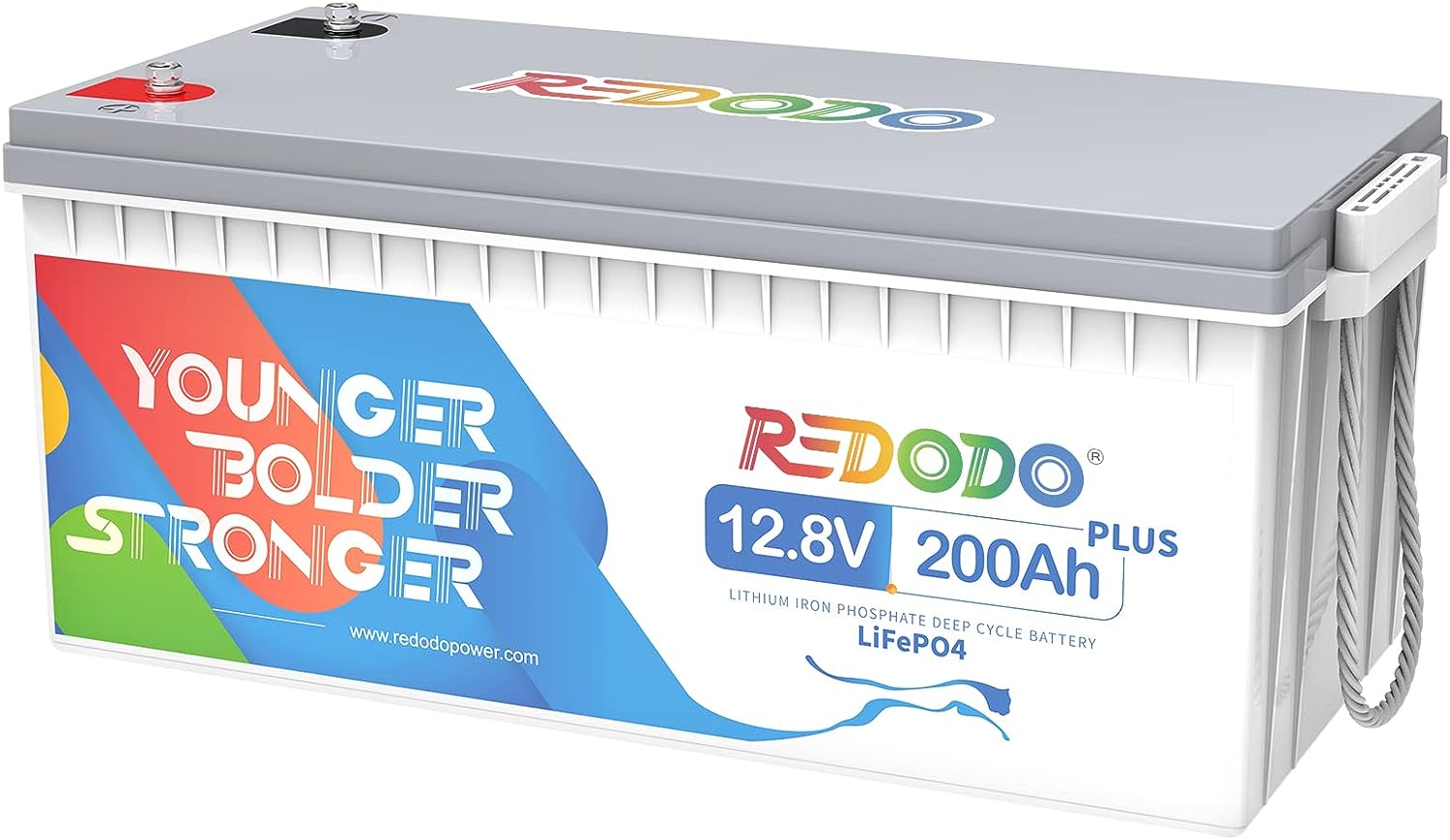Deep cycle RV batteries are an essential component for any recreational vehicle owner looking to optimize their electrical system. These specialized batteries provide the power needed to run appliances, lights, and other devices when you’re off-grid or not connected to shore power. In this blog post, we will examine the various types of deep-cycle batteries available and provide guidance on selecting the most suitable one for your requirements.
We’ll delve into lead-acid, AGM, and lithium-ion battery options while discussing their respective advantages and disadvantages. Additionally, we’ll discuss how to choose the best battery for boondocking – a popular activity among RV enthusiasts that requires reliable energy storage. Furthermore, maintaining your deep cycle RV batteries is crucial in ensuring they have a long lifespan; hence we will cover essential maintenance tips such as checking water levels (for certain battery types), keeping terminals clean from corrosion, and proper storage practices.
Finally, understanding your RV’s electrical system needs is vital in making informed decisions about deep cycle batteries – so stay tuned as we guide you through these important aspects!
Table of Contents:
- Types of Deep Cycle RV Batteries
- Choosing the Best Battery for Boondocking
- Maintaining Your RV Battery’s Lifespan
- Understanding Your RV Electrical System Needs
- FAQs in Relation to Deep Cycle Rv Batteries
- Conclusion
Types of Deep Cycle RV Batteries
If you’re looking to power your home away from home, it’s essential to choose the right type of deep cycle RV battery. The three main types of deep cycle RV batteries are lead-acid, gel, and lithium-ion; each offering its own advantages and drawbacks. Each has its own set of pros and cons that can make or break your next adventure.
Lead-acid batteries: affordable but shorter lifespan
Lead-acid batteries are the most basic option for powering your RV. They’re relatively inexpensive but come with a catch – they typically last around 400 cycles before needing replacement. If you’re limited in funds and don’t mind exchanging batteries more regularly, this could be the best option.
Gel batteries: improved deep cycle performance at a higher cost
Moving up in price (and performance), we have gel batteries. These offer better deep cycle capabilities than their lead-acid counterparts while still being less expensive than lithium-ion options. However, keep in mind that they require proper charging techniques to avoid damage over time.
Lithium-ion batteries: high efficiency and long-lasting but expensive
The cream of the crop when it comes to deep cycle RV battery technology is undoubtedly lithium-ion batteries. With longer lifespans, lighter weight, and faster charging times compared to other types, these powerhouse cells come at a premium price – but they’re worth the investment for serious RV enthusiasts. Our favorite are these 200Ah LifePO4 batteries.
When it comes to deep cycle RV batteries, there are several types available with different performance characteristics and price points. It is important to consider the best battery type for boondocking when making a purchase decision in order to maximize efficiency and longevity of your investment.

Choosing the Best Battery for Boondocking
When boondocking or camping off-grid in an RV, it’s crucial to have a reliable battery that can provide power for extended periods without access to shore power. This is where deep cycle RV batteries come into play as the top choice for boondocking enthusiasts despite their higher upfront cost.
Longer Lifespan Compared to Other Battery Types
All Deep cycle batteries boast a significantly longer lifespan than flooded lead-acid and gel-cell counterparts, often lasting up to 10 years with proper care. This means less frequent replacements and more time spent enjoying your adventures on the road. Discover more about the operation of lithium-ion batteries by reading here.
Deeper Depth of Discharge Allowing More Usable Energy Storage
A key advantage of LifePO4 is their ability to be discharged deeper (up to 80-90%) without damaging the cells. This results in greater usable energy storage capacity, ensuring you’ll never run out of juice during those long nights under the stars. Check out this informative article on different discharge methods.
Faster Charging Time Due to High Charging Efficiency
- Say Goodbye to Lengthy Charge Times: Deep-cycle RV batteries typically charge faster than traditional options thanks to their high-efficiency rates – perfect when you’re short on time between stops.
- Solar Compatibility: Pairing your deep-cycle RV battery with solar panels allows for even quicker recharging while harnessing Mother Nature’s free energy source. Discover some great solar panel options for camping.
Selecting an optimal battery for boondocking is imperative to ensure a memorable RV outing. To maximize its lifespan, it’s important to maintain and properly store your RV battery when not in use; this article will cover how to do just that.
Maintaining Your RV Battery’s Lifespan
The longevity of your deep cycle RV battery depends on how well you use, maintain, and charge it. Proper maintenance practices can extend your battery’s life while ensuring optimal performance during your trips. Let’s look into some essential tips to maximize the life of your deep cycle RV battery.
Regularly Checking Water Levels (for Lead-acid and Gel)
For lead-acid and gel batteries, it is crucial to regularly check the water levels. Make sure the electrolyte covers the plates but doesn’t exceed the maximum level line. Top off with distilled water when needed – tap water contains minerals that can damage your battery.
Keeping Terminals Clean from Corrosion
Battery terminals tend to corrode over time, which may cause poor connections and reduced efficiency. To prevent this issue, clean them periodically using a mixture of baking soda and vinegar, followed by applying petroleum jelly or terminal protectant spray for added protection.
Properly Storing When Not in Use
- Disconnect: Remove any connected devices or chargers before storing.
- Fully Charge: A fully charged battery will better withstand long periods of storage without losing capacity.
- Avoid Extreme Temperatures: Store in a cool, dry place away from direct sunlight or freezing temperatures (Battery University recommends between 10°C and 25°C).
When it comes to choosing the right battery for your RV, there are several options available. Deep cycle RV batteries are a popular choice for RV owners because they are designed to handle deep discharge and recharge cycles. These batteries are available in different types, including flooded lead-acid batteries, gel batteries, and lithium batteries.
Flooded lead-acid batteries are the most common type of deep cycle RV battery. They are affordable and reliable, but require regular maintenance to check water levels and prevent corrosion. AGM batteries are maintenance-free and can handle deep discharge cycles, but are more expensive than flooded batteries. Lithium batteries are a newer type of battery that offer high performance and require minimal maintenance, but are also the most expensive option.
When choosing a battery, consider your power needs and budget. A single battery may be sufficient for some RV owners, while others may require a battery bank to power multiple devices.
Finally, it’s important to note that lithium batteries are becoming increasingly popular among RV owners due to their long lifespan, high performance, and fast charging capabilities. While they are more expensive than other types of batteries, they may be a worthwhile investment for frequent RVers.
Overall, good deep cycle batteries are essential for RV owners who want to enjoy their trips without worrying about battery issues. By following proper maintenance practices and choosing the right battery for your needs, you can ensure that your RV house battery will be fully charged and ready to go on your next adventure.
By adhering to the advice mentioned, your RV battery can be kept running for a prolonged period. Now let’s take a look at understanding your RV electrical system needs and how they relate to the proper care of deep cycle batteries.
Understanding Your RV Electrical System Needs
Before you invest in a deep cycle RV battery, it’s essential to become familiar with your specific electrical system requirements. Gaining familiarity with your electrical system needs is essential before purchasing a deep cycle RV battery, to make sure you pick the right one and get the best performance during your travels.
Determining Amp-Hour Capacity: The first step is to calculate the amp-hour capacity needed based on usage patterns and appliances within your rig. List the wattage ratings of all devices using DC power (e.g., lights, fans, water pumps) to calculate amp-hour capacity needed for optimal performance. Then estimate how many hours per day each device will be used. Multiply these values together and divide by 12 volts to get an approximate daily amp-hour consumption figure.
- Learn more about calculating amp-hours here.
Solar Panels or Generators: If you plan on boondocking frequently or want additional peace of mind when it comes to power supply, consider upgrading your RV with solar panels or a portable generator. These options can supplement energy from your deep cycle batteries while reducing overall strain on them – extending their lifespan.
In short, understanding how much power you need and planning accordingly ensures smooth sailing (or should we say driving?) throughout all of life’s adventures.
FAQs in Relation to Deep Cycle Rv Batteries
Is a Deep Cycle Battery Good for an RV?
Yes, a deep cycle battery is ideal for an RV because it provides consistent power over extended periods and can handle repeated charging and discharging cycles. This type of battery is designed to provide continuous energy output, making it suitable for powering appliances and devices in your RV.
How Long Should a Deep Cycle RV Battery Last?
A quality deep cycle RV battery typically lasts between 2-7 years, depending on the type of battery, usage patterns, maintenance practices, and environmental factors. Proper care such as regular water level checks (for lead-acid batteries), keeping terminals clean from corrosion, and appropriate storage will help extend its lifespan.
What Should I Look for in a Deep Cycle RV Battery?
When choosing a deep cycle RV battery, consider factors like capacity (amp-hours), voltage compatibility with your electrical system needs, depth of discharge capabilities allowing more usable energy storage, charging efficiency rates (source), weight restrictions, or space constraints within your vehicle’s design.
Is a Marine RV Battery the Same as a Deep-Cycle One?
No, while both types are used in similar applications requiring sustained power output over time, marine batteries often have dual-purpose designs that combine starting and reserve capacities. True deep-cycle batteries focus solely on providing steady current flow without sacrificing longevity through multiple charge-discharge cycles typical of recreational vehicle use cases.
Conclusion
In conclusion, when it comes to choosing the right deep cycle RV battery for your needs, there are several options available. Lead-acid batteries are affordable but have a shorter lifespan, while gel batteries offer improved performance at a higher cost. Lithium-ion batteries, although expensive, offer superior efficiency and extended power duration.
To get the most out of your RV battery, it’s essential to maintain its lifespan by regularly checking water levels (for lead-acid and gel), keeping terminals clean from corrosion, and properly storing it when not in use. Understanding your RV electrical system needs is also crucial to ensure you choose the best battery for boondocking.




